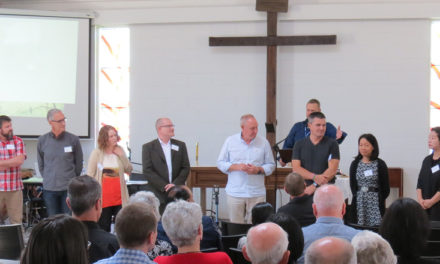Learning To Thrive
Tena tātou katoa e te iwi mīhana… (Greetings to all the people in mission),
This month’s whakataukī (proverb) is: “Whāia te mātauranga hei oranga mō koutou.” (Seek after learning for the sake of your collective wellbeing). In his book Te Hāhi Mihinare, Dr Hirini Kaa states that, mātauranga Māori refers not only to Māori values and attitudes, but also to the Māori way of knowing; underpinned by key principles such as whanaungatanga (relationships), tapu (sacredness), utu (reciprocity), mana (authority) and kaitiakitanga (guardianship), all of which are interrelated. So, to seek after learning means much more than simply the acquisition of cognitive knowledge. It refers to the art of understanding how to live and interact with honour in our families, and with our friends, neighbours, fellow citizens and habitats. It requires a great deal of time, and interpersonal interaction. If we do that, this proverb promises, we will thrive in our collective wellbeing.
The same goes for our missions groups, whether our field based communities, sending organisations, or collaborative networks, including churches. Seeking after the kind of learning that is transformative is something we all need to do lest we atrophy into irrelevance. Missions Interlink Australia Director, Nataliya Osipova realised this when she asked Andrew Scott from OM USA (with Jonathan Thiessen) and myself to tag-team as plenary speakers at the MI Australia National conference the last week of July. She wanted to ‘stir up’ the missions leaders to some serious critical thinking. Well, she asked for it. Neither Andrew/Jonathan nor I pulled punches in our opinions of the crisis facing traditional missionary sending organisations and its implications.
We learn from being confronted with information or perspectives we hadn’t considered
The objective was not to undermine but to challenge in order to build up. As I noted in my presentations we learn from being confronted with information or perspectives we hadn’t considered. Usually those things are thrust upon us unexpectedly. In some educational circles this is called “rupturing”. The learning cycle is to create dissonance and then help the ‘student’ process it through to resonance.
One of the ‘thought-grenades’ I lobbed into the mix was that I do not believe that the concept of the “Great Commission” is fit for purpose in missions today, or as a framework for churches to speak about their ministries in the world. As I have done before in various forums, I explained how the concept of the Great Commission is too heavily rooted in colonial assumptions, drawing as it does from the age of exploration’s theological self-justification and Eurocentric legislation, where European civilisation was deemed superior and non-European peoples and their land were justifiably (in the mind of the Europeans) dominated by “Christendom”.
The “Great Commission”… still informs our motivations for missions with an implicit sense of superiority towards those we seek to “reach” with the gospel.
Rarely is this backdrop to the Great Commission conscious in the minds of Evangelicals, yet it still informs our motivations for missions with an implicit sense of superiority towards those we seek to “reach” with the gospel.
Today, any sense of superiority is deemed unacceptable and the idea of imposing an outside view on a people or group is morally reprehensible. But rather than becoming defensive and exerting our God-given ‘right’ to go into all the world (proving our arrogance), we have an opportunity to learn from those who would criticise missions for the harm it has done (regardless of the good that can also legitimately claimed). The Great Commission is a concept, it is not doctrine and it does not even accurately exegete Matthew 28:18-19 in light of the rest of Matthew’s gospel (compare Matthew 28:18-20 with Matthew 10:5-8 for example). We can afford to relegate the concept to the annals of missions history.
God’s purpose is to create integrated shalom communities as a witness to the world.
Suggesting this about the Great Commission understandably created some dissonance with the missions leaders at the Melbourne meeting. I placated some with a proposal that we look at the mountain of evidence in Scripture, the early Church and even current World Christianity studies, which suggest that John 17:18-26 is a better motivating verse for our participation in God’s purposes today. From this passage, which I call “The Great Commitment”, I suggested God’s purpose is to create integrated shalom communities as a witness to the world. This, I think, is a more appropriate way forward for missions. It approaches missions from a co-creation perspective where the recipient or host is a full participant in learning about Jesus and building God’s kingdom alongside the messenger. Co-learners rather than learner/teacher. It is about building communities with God, not taking territories for God. It is about incarnating rather than invading, dwelling not dominating.
Co-creating and co-learning positions us to be much more willing to develop equitable relationships, there is a sacredness in the mutual growth, discovery is reciprocal, it respects the authority of all involved, especially the local, and it allows the indigenous or local believer to take responsibility as a guardian of the gospel for their community. The learning journey should be marked by loving kindness for one another, ultimately for mutual benefit. This would exemplify what Māori mean by mātauranga.
True learning comes from a heart open with holy curiosity, willing to engage those we meet as people loved by God and made in the image of God. I pray that we will be open to alternative perspectives on what God’s purpose is in/for the world. By listening well to one another and seeking to understand, we will indeed collectively thrive, enabling us to #stayonmission.
Arohanui ki a koutou e haere ana ki te ao (love to you all as you go into the world),
Jay






